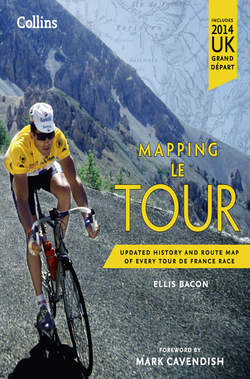Читать книгу Mapping Le Tour: The unofficial history of all 100 Tour de France races - Ellis Bacon - Страница 12
Оглавление1904
2nd Edition
“The Tour de France is over, although its second edition will have been, I fear, its last – a victim of its own success.”
Henri Desgrange, founder of the Tour de France, following the 1904 race
| Start: Paris, France, on 2 JulyFinish: Paris, France, on 24 July | |
| Total distance: 2428 km (1509 miles)Longest stage: 471 km (293 miles) | |
| Highest point:Col de la République: 1161 m (3809 ft)Mountain stages: 1 | |
| Starters: 88Finishers: 15 | |
| Winning time: 96 h 05’ 55”Average speed: 25.265 kph (15.699 mph) | |
| 1. Henri Cornet (Fra)2. Jean-Baptiste Dortignacq (Fra) at 2 h 16’ 14”3. Aloïs Catteau (Bel) at 9 h 01’ 25” |
It’s become somewhat of a cliché, but the second edition of the Tour de France, in 1904, was almost its last.
Geographically, the 1904 Tour followed the same route as the first edition the previous year, again starting in Paris and taking in the major cities of Lyon, Marseille, Toulouse, Bordeaux and Nantes, before finishing once more in the Parc des Princes, Paris.
However, the race was marred by interventions from a by-now feverish public, while following the race it was discovered that the first four in the overall classification, including defending champion Maurice Garin, had cheated, and were disqualified from the race, handing victory to 19-year-old Henri Cornet, who remains the race’s youngest-ever winner.
On the race’s second, hilliest stage, between Lyon and Marseille, local Lyon lad Antoine Fauré led the race over the Col de la Rébublique while behind him the race favourites, including Garin and his brother, César, were set upon by masked men, believed to be Fauré’s supporters.
That year was also the first recorded instance of tacks being thrown onto the road by partisan crowds – something that would happen intermittently throughout the Tour’s history, including as recently as the 2012 Tour when the race passed over the Mur de Péguère on stage 14.
It took some time for the organisers of the 1904 Tour to wade through all the accusations and rumours at the end of the race, but in November they came to the decision to ban the two Garin brothers – who had finished first and third – with the older Maurice having apparently illegally been given food by one of the race organisers themselves, as well as allegedly having covered part of the route by train.
Runner-up Lucien Pothier was handed a lifetime ban by French governing body the Union Vélocipédique Française (although he was later permitted to start the Tour again, in 1907), while fourth-placed Hippolyte Aucouturier, again one of the race favourites, having failed to finish the first stage of the 1903 race due to illness, was one of those believed to have cheated by gripping a cork in his mouth that was attached to a string tied to the back of a car.
Spectators use tacks and pebbles to sabotage the stage between Nantes and Paris
